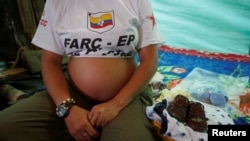Tatiana, her pregnant belly bulging beneath a T-shirt decorated with the FARC rebel group's logo, leans down to stroke her teenage son's hair, as if to reassure herself he is really beside her.
The 36-year-old mother-to-be is a 19-year veteran of the Revolutionary Armed Forces of Colombia, which will sign a peace deal with the government next week to end a 52-year war.
As rebel delegates from across the country gather on the Yari Plains in southern Colombia for a meeting to ratify the accord, the rank and file are preparing to hand in their weapons and return to families many have not seen for decades.
Tatiana's baby boy, due in December, will have a very different life from his 17-year-old half brother, who was able to visit his mother for the first time since he was 2.
"Things have been much more joyful this time," said Tatiana, as she sat in her camp lean-to next to Omar, her 28-year-old partner. "I am very happy."
Raised by fighter's brother
Tatiana had her first son, who declined to be interviewed, at 19, two years after joining the FARC. He was raised by her brother, away from military bombing raids and ambushes.
The shy teenager, who often touched his mother's hand or put an arm around her, grinned ruefully when Tatiana urged him to go back to school. She joined the rebels in part because her poor parents could not fund an education.
Her current pregnancy was unintentional. Rebel couples must seek permission from their commanders to have sexual relations, and guerrilla doctors often perform abortions. Babies can usually be carried to term only if a relative will take them in.
Now that a final signature on the deal is near, FARC couples have begun to look forward to once-forbidden parenthood.
"It's only now we're thinking of it as possible," said Yefferson, 36, who has been with his partner, Patricia, for six years. "We want a family where we can educate our children, where they can be professionals. We don't want them to live through what we have lived through."
Despite his first child's impending arrival, Omar said he was still committed to the Marxist cause and would return to fight if the peace accord fell through.
"If the government does not hold its part of the deal and we have to leave our son, then we will leave him," he said.
